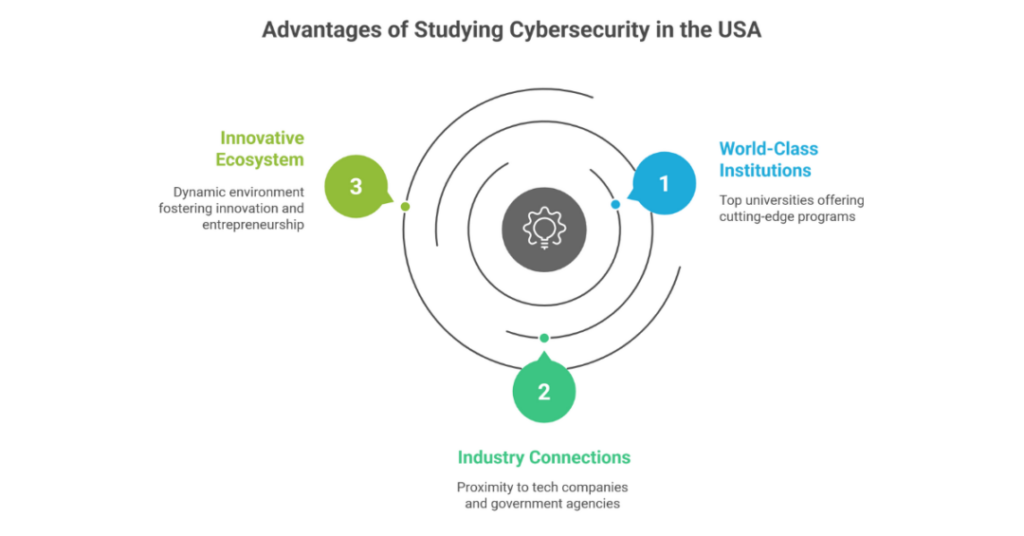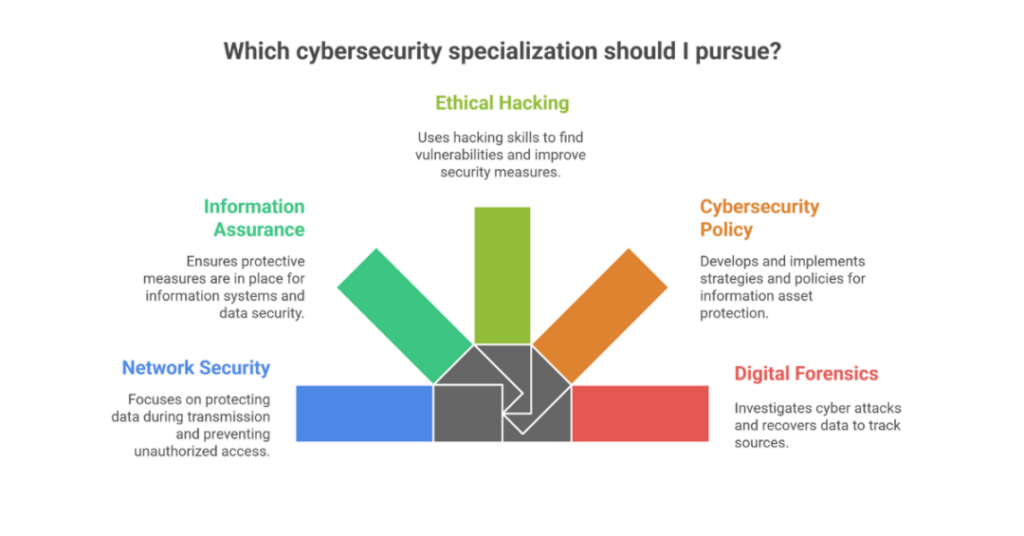30 August 2025
7 minutes read
10 Top Cyber Security Universities in USA for Indian Students

Key Takeaways
- Top cyber security universities in USA offer globally ranked programs, cutting-edge research, and strong ties with industry and government.
- The US Bureau of Labor Statistics projects rapid job growth for information security analysts through 2025, ensuring excellent career prospects.
- Indian students gain hands-on experience in areas like network security, ethical hacking, and digital forensics, boosting employability worldwide.
Cybersecurity has become a cornerstone of information technology and national security in the United States. With the increasing reliance on digital technologies, the protection of computer systems, networks, and data from digital attacks is more crucial than ever.
This has led to a burgeoning demand for skilled cybersecurity professionals, capable of defending against a wide range of cyber threats, from hacking and data breaches to sophisticated cyber espionage.
Why Study Cybersecurity in the USA?
Studying cybersecurity in the USA offers numerous advantages:

- World-Class Institutions: The USA is home to many of the world’s top universities for cybersecurity, offering cutting-edge programs and research opportunities.
- Industry Connections: Proximity to leading tech companies and government agencies provides unparalleled internship and employment opportunities.
- Innovative Ecosystem: The dynamic cybersecurity ecosystem in the USA fosters innovation, collaboration, and entrepreneurship, making it an ideal environment for aspiring cybersecurity professionals.
By studying in the USA, students gain access to a wealth of resources and opportunities that can propel their careers in cybersecurity.
10 Top Best Universities for Master in Cybersecurity in the USA
Choosing the right university for an MS in Cyber Security is crucial, especially with the rising demand for cybersecurity graduates. According to the US Bureau of Labor Statistics, the employment of information security analysts is projected to grow much faster than average through 2025.
For international students, the universities in the USA offer some of the best cybersecurity degree programs, combining research, practical learning, and partnerships with the National Security Agency and the Department of Homeland Security.
1. Carnegie Mellon University (CMU)
Carnegie Mellon consistently ranks among the top universities for masters in cybersecurity in the QS World University Rankings. Its MS in Information Security program is known for strong ties with the National Security Agency and prepares students for careers in cyber defense, system security, and security engineering.
2. Stanford University
Stanford’s computer science program offers a specialized master’s of cybersecurity track. Ranked highly in US News rankings, it equips students in cybersecurity analytics, privacy, and technical cybersecurity, producing graduates who often become security officers and leaders in cybersecurity management.
3. Massachusetts Institute of Technology (MIT)
MIT is among the most prestigious universities in the USA for a cybersecurity master’s program. Its focus on application security, cyber risks, and security analysis ensures students gain hands-on skills in cybersecurity that covers both engineering and management aspects.
4. University of California, Berkeley (UC Berkeley)
UC Berkeley offers one of the best universities for cyber security programs with its Master of Information and Cybersecurity (MICS). Known for academic excellence in world university rankings, it offers online programs as well, making it flexible for international students.
5. Georgia Institute of Technology (Georgia Tech)
Georgia Tech’s cyber security program stands out for research in wireless security, cybersecurity risk, and cyber defense. Recognized in the Times Higher Education World University Rankings, it is a top choice for those seeking a degree in cybersecurity.
6. New York University (NYU) – Tandon School of Engineering
NYU Tandon is one of the best colleges offering specialized graduate programs in cybersecurity. With strong links to the Department of Homeland Security and the National Security Agency, it provides pathways in cybersecurity management, cyber risks, and system security.
7. Purdue University
Purdue ranks high among national universities and offers a dedicated cybersecurity master’s through its computer and network security labs. The degree program is recognized for training cybersecurity and privacy professionals for roles in homeland security and the national defense sector.
8. University of Southern California (USC)
USC’s cybersecurity master’s program combines cybersecurity analytics, cybersecurity risk, and security engineering with practical projects. Ranked among the top 10 universities in the USA, USC is popular with international students pursuing programs in cybersecurity.
9. Johns Hopkins University
Johns Hopkins offers a highly technical cybersecurity master’s that emphasizes computer and network security, cybersecurity experience, and system security. It is especially attractive for students planning careers in cybersecurity analytics and information assurance.
10. University of Illinois Urbana-Champaign (UIUC)
UIUC is one of the top cyber security universities recognized in QS World University Rankings. Its cybersecurity degree program covers application security, cyber risks, and cybersecurity management, preparing graduates for roles as security officers and information security analysts.
5 Best Universities for Master in Cybersecurity in the USA
Choosing the right university for a Master’s in Cybersecurity is crucial. The best institutions not only provide a solid theoretical foundation but also offer practical experience through labs, internships, and collaboration with industry leaders.
| University Name | Location | Highlighted Program Features | Unique Opportunities | Industry Connections |
|---|---|---|---|---|
| Stanford University | California | Interdisciplinary programs, focus on cybersecurity engineering and computer science | Access to Silicon Valley, leading-edge research initiatives | Strong ties with tech giants, startup ecosystem |
| Massachusetts Institute of Technology (MIT) | Massachusetts | Advanced coursework in network security, cryptography, and information security | MIT Lincoln Laboratory for Research, MIT Cybersecurity Policy Initiative | Collaboration with government agencies and the private sector |
| Carnegie Mellon University | Pennsylvania | Dedicated cybersecurity tracks, including the MS in Information Security | CyLab Security and Privacy Institute, cutting-edge research | Partnerships with major corporations, Department of Defense engagements |
| University of California, Berkeley | California | Emphasis on both technical and policy aspects of cybersecurity | Berkeley Center for Long-Term Cybersecurity, diverse research projects | Connections with Bay Area tech companies, policy think tanks |
| Georgia Institute of Technology | Georgia | Comprehensive curriculum covering information security, policy, and management | Advanced Cybersecurity Lab, Institute for Information Security & Privacy | Collaboration with industry leaders, government contracts |
Admission Requirements for MS in Cybersecurity
Admission to a Master’s in Cybersecurity program in the USA requires:
- Bachelor’s Degree: Preferably in computer science, information technology, or a related field, from an accredited institution.
- GRE Scores: While not always mandatory, many programs require GRE scores as part of the application process.
- Professional Experience: Some programs may prefer or require work experience in a related field.
- Letters of Recommendation: Typically 2-3 letters from academic or professional references.
- Statement of Purpose: A detailed essay outlining the applicant’s interest in cybersecurity, career goals, and reasons for choosing the program.
- English Proficiency: TOEFL or IELTS scores for non-native speakers.
Meeting these requirements is the first step toward securing a place in a top cybersecurity program.
Exploring Cybersecurity Specializations
The field of cybersecurity is vast and varied, offering numerous pathways for students and professionals to explore based on their interests and career aspirations.

Delving into these specializations not only enhances one’s expertise but also opens up a multitude of career opportunities in both the public and private sectors. Here are some of the key areas of specialization within cybersecurity:
- Network Security: This specialization focuses on protecting data during transmission. Network security professionals develop strategies to prevent unauthorized access, misuse, malfunction, modification, destruction, or improper disclosure, ensuring the integrity and confidentiality of data. Skills in firewall management, intrusion detection systems, and virtual private networks (VPNs) are essential in this domain.
- Information Assurance: Information assurance specialists work to protect and manage the risks related to the use, processing, storage, and transmission of information or data. They ensure that protective measures are in place for the security of information systems and data. This specialization requires a deep understanding of risk management, legal issues, policy making, and compliance standards like ISO/IEC 27001.
- Ethical Hacking and Penetration Testing: Ethical hackers and penetration testers are the “good guys” in cybersecurity, employed to use their skills to find vulnerabilities in systems before malicious attackers can exploit them. This specialization is for those who enjoy thinking like a hacker to improve security measures. It covers areas such as system exploitation, web application attacks, and the development of countermeasures.
- Cybersecurity Policy and Governance: This area is ideal for individuals interested in the intersection of policy, law, and cybersecurity. Specialists in cybersecurity policy and governance develop and implement strategies, policies, and standards to ensure that an organization’s information assets are protected. This specialization requires knowledge of cybersecurity laws, regulations, compliance requirements, and ethical considerations.
- Digital Forensics: Specialists in digital forensics are involved in investigating cyber attacks and breaches. They recover data from digital devices to track the source of a cyber attack or other illicit activities. Skills in data analysis, recovery techniques, and legal knowledge for presenting findings in court are crucial in this specialization.
Cybersecurity Career Prospects in the USA
| Career Path | Description | Key Skills Required | Potential Employers |
|---|---|---|---|
| Security Analyst | Monitors networks for security breaches and investigates violations | Analytical skills, knowledge of threat mitigation techniques | Tech companies, government agencies, financial institutions |
| Cybersecurity Engineer | Designs and implements secure network solutions | Strong technical background, experience with security software and hardware | Defense contractors, cybersecurity firms, large corporations |
| Information Security Manager | Oversees an organization’s information security program | Leadership skills, comprehensive cybersecurity knowledge | Healthcare organizations, educational institutions, multinational companies |
| Penetration Tester | Conducts authorized attacks on systems to identify vulnerabilities | Expertise in hacking techniques, creative problem-solving | Security consultancies, large corporations with internal security teams |
Cybersecurity Salary Insights
| Job Title | Average Annual Salary (USD) | Entry-Level Salary (USD) | Mid-Level Salary (USD) | Senior-Level Salary (USD) |
|---|---|---|---|---|
| Security Analyst | $75,000 – $95,000 | $58,000 – $70,000 | $76,000 – $90,000 | $95,000 – $115,000 |
| Cybersecurity Engineer | $90,000 – $120,000 | $70,000 – $85,000 | $95,000 – $110,000 | $120,000 – $140,000 |
| Information Security Manager | $120,000 – $150,000 | $95,000 – $110,000 | $115,000 – $130,000 | $150,000 – $180,000 |
| Penetration Tester | $80,000 – $130,000 | $60,000 – $75,000 | $85,000 – $105,000 | $130,000 – $160,000 |
The Importance of Practical Experience
In the rapidly evolving world of cybersecurity, theoretical knowledge alone is not sufficient to prepare for the challenges and dynamic nature of real-world threats.
Practical experience is a cornerstone of effective cybersecurity education and career development. Here are some reasons why hands-on experience is vital:
- Bridging the Gap Between Theory and Practice: Practical experience allows students to apply theoretical concepts to real-world scenarios, helping them understand how cybersecurity principles are implemented in practice. It deepens their understanding and enhances problem-solving skills.
- Exposure to Cutting-Edge Technologies: Through labs, internships, and practical projects, students get hands-on experience with the latest cybersecurity tools and technologies. This exposure is invaluable, keeping them up-to-date with current trends and practices in the industry.
- Developing Critical Thinking and Problem-Solving Skills: Facing real-world challenges helps students develop critical thinking and adaptability. They learn to analyze situations, think creatively, and devise effective strategies to mitigate risks and respond to cyber threats.
- Enhancing Employability: Practical experience significantly enhances a student’s employability. Employers look for candidates who not only have theoretical knowledge but also can demonstrate the ability to apply that knowledge in practical situations. Internships and project work provide evidence of these skills.
- Networking Opportunities: Engaging in practical experiences, such as internships and industry projects, allows students to build professional networks. These connections can be invaluable when seeking employment or career advancement.
Conclusion
The USA is at the forefront of cybersecurity education, offering programs that combine theoretical knowledge with practical experience.
By choosing one of the top universities for a Master’s in Cybersecurity, students can pave the way for a successful career in this ever-evolving field.
With the right education and skills, the opportunities in cybersecurity are boundless, making it an ideal choice for those interested in technology and digital security.
FAQs
What is the duration of a Master’s in Cybersecurity program in the USA?
Typically, it takes 1-2 years to complete, depending on the program structure and whether the student is enrolled full-time or part-time.
Can I work in the USA after completing my Master’s in Cybersecurity?
Graduates often have opportunities to work in the USA, especially given the high demand for cybersecurity professionals. Visa regulations and work authorization details should be checked based on current policies.
Do I need a background in computer science for a Master’s in Cybersecurity?
While a background in computer science or a related field is advantageous, some programs offer foundational courses for students from other disciplines.
How competitive are admissions for cybersecurity programs in the USA?
Admissions competitiveness varies by program, but the field is generally competitive due to the high demand and the growing importance of cybersecurity.
Do the top cyber security universities in USA offer practical learning experiences?
Top cyber security universities in USA emphasize hands-on labs, real-world cyber ranges, and internships with industry partners.
Are top cyber security universities in USA recognized by federal agencies?
Many top cyber security universities in USA are designated as Centers of Academic Excellence by the NSA and Department of Homeland Security.
What career opportunities await graduates from top cyber security universities in USA?
Graduates from top cyber security universities in USA often secure roles at leading tech companies, government agencies, and global organizations.

You can study at top universities worldwide!
Get expert tips and tricks to get into top universities with a free expert session.
Book Your Free 30-Minute Session Now! Book a call now




























